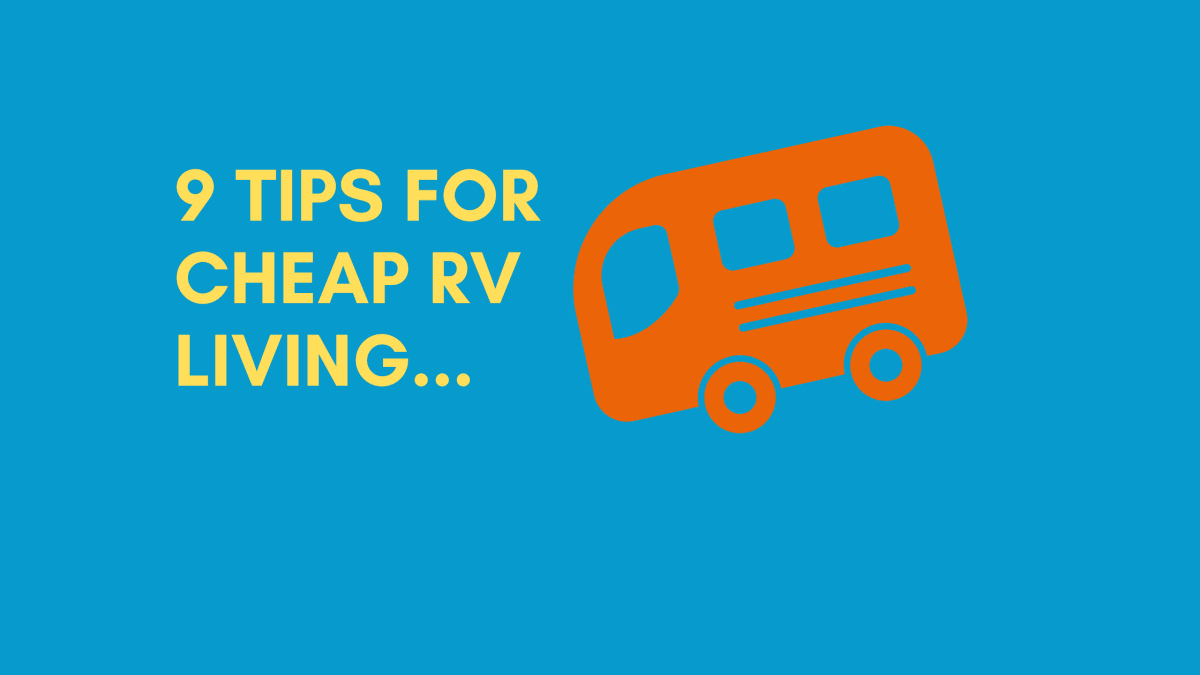Are you itching to explore the country in an RV, but are worried about the cost of living once you’re on the road? We don’t blame you—RVing can be a costly prospect.
Fortunately, affordable RV living is possible if you know what you’re doing. Read on to learn our best tips for RVing on a budget.
9 Tips For Cheap RV Living
1. Keep It Simple
This is one of the most basic RV tips, which is why we’ve listed it first. Do you own an RV or travel trailer yet? If not, consider buying a less expensive model with fewer amenities.
While fancy class A motor homes with fireplaces and big-screen TVs are impressive, they’re not necessary. As long as your home on wheels is comfortable and secure, you can get by without the high-end extras. In fact, it doesn’t even need to have a bathroom if you stick to campgrounds that offer showers and toilets. This will help cut down on maintenance costs as well.
2. Prepare Your Own Meals
This tip might seem to contradict the previous one, but when it comes to cheap RV living, good kitchen facilities are essential. If your camper comes with an oven, stove top, microwave, built-in grill, or any of the above, you have everything you need already.
Stock up on groceries from supermarkets or big-box stores, and refrain from visiting restaurants when you’re on the road. You’ve already invested in a rig with kitchen facilities; now make them go to work for you.
Of course, if you don’t have these amenities, you can always use the grill or fire ring at your campsite. Your options might be a bit more limited, but you’ll still be able to prepare basic meals.
Another money-saving food tip: Prepare a whole chicken or pot roast, then work the leftovers into soups, stews, and casseroles later in the week. If you plan ahead, you can create delicious campground meals for pennies per serving.
3. Shop Around For Sites
Steer clear of any campground that bills itself as a “resort” park. These are often prohibitively expensive, and you’re not really getting that much more for the money. If you need access to restroom facilities, you’ll want to choose carefully, but there’s no need to pay a premium fee for a night’s rest.
Before you leave home, conduct an online search to see if there are any public BLM spots or state campgrounds along your route. National park campgrounds are another nice option, and you’ll get to check a few historic sites off your bucket list to boot. Walmart and Cabela’s may also allow you to park your camper overnight; call ahead to make sure this won’t be a problem at the ones you’ll be visiting.
If you would prefer to stay at a privately owned campground, do some research so you can stake out the least expensive spots. Some places will charge as little as $10-$12 per night—sometimes even lower if you stay for a month or longer.
4. Stay Put
While we’re on the subject of month-long stays, you’ll save a great deal of money on fuel when you decide to park in one spot for that long. If it’s affordable RV living you’re after, pick an area that you’ve always wanted to visit, then drive your rig there and settle in for a lengthy stay. You’ll cut way back on your vehicle’s wear and tear, and you won’t have to shell out a wad of cash at the gas pump every day.
While some people might scoff at this idea, claiming that RVing is all about the motion, this can actually be a restful and enriching experience. Instead of logging hundreds of miles per day behind the wheel, you’ll have a chance to explore the surrounding terrain. Who knows? You might even make a lifelong friend or two.
5. Consider A Passport America Membership
The annual membership fee for Passport America is currently $44. When you sign up, you’ll receive a whopping 50 percent off the regular nightly rate at participating campgrounds. That means you should be able to recoup the cost of the annual fee in as little as one week, depending on where you stay.
Passport America has a trip planning app, which you can use whether you’ve signed up for a membership or not. All you need to do is enter your destination and criteria, and it will provide you with a map of participating sites. That means you can decide in advance whether the fee will be worth it for this particular trip. Even if it doesn’t seem to be a good deal now, however, there’s a good chance you’ll have more opportunities to take advantage of the perk in the weeks and months to come.
6. Be A Do-It-Yourselfer
Anyone who can fix their own camper when problems arise is one step ahead of the game, financially speaking. Campers on a budget would do well to learn a few tricks regarding basic maintenance and repair. Invest in a set of quality tools, and keep them with you whenever you’re camping. Make sure not to buy cheap tools—they’ll pay for themselves the first time you need them, and it will be a lot less expensive than visiting a mechanic.
7. Embrace The Workamping Lifestyle
If you’ve never heard of workamping, here’s the rundown: It involves trading labor for a place to park your camper, instead of paying the regular fee. As you might have guessed, the word is a mash-up of “work” and “camping,” and that’s exactly what it means.
When you’re pulling into a park or campground, ask the attendant if they’re hiring workampers at the moment. Chances are, they’ll have heard the question before. If not, ask if you can speak to the manager. Explain that you’re willing to work in order to earn your spot, and find out whether they have any positions available that would match up with your skill set. You can also plan ahead by checking a website like workampingjobs.com, which posts a list of available positions all across the country.
8. Keep Your Priorities Straight
As long as you’re willing to cut back on creature comforts, cheap RV living might be easier than you think. Having a limited amount of living space means you’ll have to think carefully about whether certain purchases are worth it. Do you really need that extra pair of shoes, or that handheld massager, or the latest electronic gadget? Ask yourself if your life will really change for the better if you make this purchase.
9. Make Your RV Work For You
Strictly speaking, it’s not cheap to keep or maintain an RV, but it’s possible to earn money off your rig if you know what you’re doing. Unless you’re a full-timer, consider renting out your unit when you’re not using it. After all, it’s not doing any good just sitting in storage, so why not put it to work and make some money for your next adventure?
There are many sites that allow you to list your camper and find like-minded RVers to rent it. Outdoorsy.com is one example, but you can shop around and choose the one that works best for you. The process is similar to what you might go through with vacation rental websites like Airbnb or Vrbo, only with RVs instead of brick-and-mortar homes. If you find enough renters within any given year, you can fund your own trips without dipping into your savings account.
In Conclusion
These RV tips are designed to help you enjoy your next road trip while staying within a designated budget. The secret is to plan ahead and not spend any more than you have to on meals, campground fees, or extras. Once you’ve gotten the hang of it, you should be able to come up with your own unique ideas for affordable RV living.
Best of luck, and happy camping!
Check out our article on: Great RVs For Full-Time Family Living

